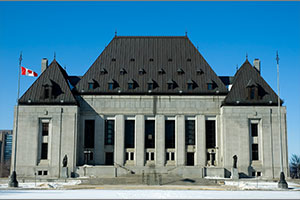UOIT lecturer: Tough questions remain after Supreme Court ruling on assisted suicide
February 11, 2015

The Supreme Court (SCOC) delivered a decisive answer February 6 on Canada’s existing law on assisted suicide. The SCOC’s nine justices were unanimous in ruling to strike down the law. But a Faculty of Health Sciences (FHS) lecturer at the University of Ontario Institute of Technology (UOIT) says Canadians are now facing a multitude of difficult ethical questions on a very divisive topic.
“Only time will tell if the verdict achieves everything sought by those supporting the right for patients to die with a physician’s assistance,” said Dr. Milly Ryan-Harshman, who teaches various FHS courses including Perspectives in Health, and Ethics. “The Court was very clear: a wide range of dilemmas need to be resolved in the months and years ahead. These discussions won’t be simple because the questions will have moral, political and even geographical considerations.”
The SCOC says Canadians with ‘grievous and irremediable medical conditions’ should have the right to ask a doctor to help them die. However, the ruling does not take immediate effect: the current law banning doctors from assisting in suicides will remain in effect for one year.
“The Court recognizes Canadians will need some time to figure this all out,” said Dr. Ryan-Harshman. “Twelve months may be unrealistic. It’s quite possible in 2016 Canada will be without a law on medically assisted death, just like we’ve been without a law on abortion since 1988.”
How likely would it be for the federal government to pass new legislation in an election year? Will provinces be left with the task of developing their own individual laws? Regulatory bodies like provincial Colleges of Physicians and Surgeons are also weighing tough questions as they wrestle with their own policies.
“Doctors have always been trained for the purpose of healing, so they will ultimately bear pressure from their patients and their colleagues. Will a physician’s right-of-conscience be protected? Will they have an opportunity to say ‘no’, and if they do, what would govern their obligations to make any referrals or provide further information to families of patients? What are the rights of people with disabilities, or someone with a mental illness?”
Rather than embark on a long and protracted debate over doctor-assisted suicide, Dr. Ryan-Harshman wonders if Canadians might be better served through the safeguards in place that guide consent to existing end-of-life care, such as palliative sedation, the right to refuse artificial nutrition and hydration, and to refuse life-sustaining medical equipment.
“Palliative care and hospice services are very inconsistent across Canada, particularly in rural communities. If we could improve that system, would that be a better national investment in the long term?”
In the end, the choices every patient or family makes will likely be on a case-by-case basis, as it has always been.
“We all fear death to at least a certain extent, and the pain, suffering and burden it poses on loved ones. Canadians may favour the right for anyone to seek medical assistance regarding death, but that doesn’t necessarily mean they will choose it. In the state of Oregon for example, where they have a law, the number of assisted suicide cases is very low. That may also turn out to be the case in Canada, regardless of the shape and form of any future laws.”
Media contact
Bryan Oliver
Communications and Marketing
Ontario Tech University
905.721.8668, ext 6709
289.928.3653
bryan.oliver@uoit.ca



